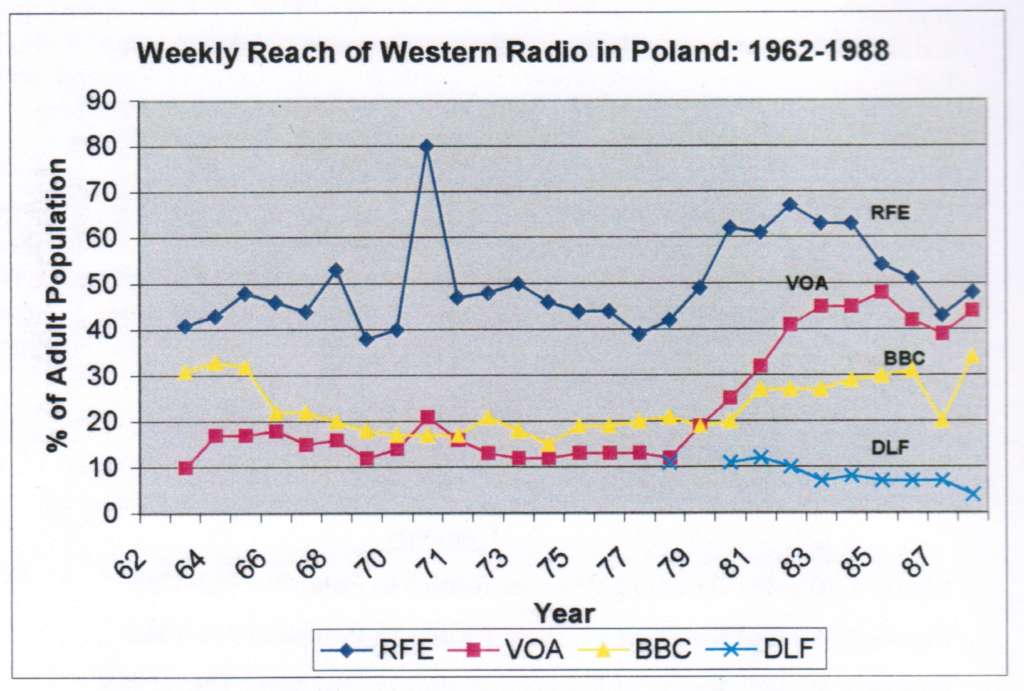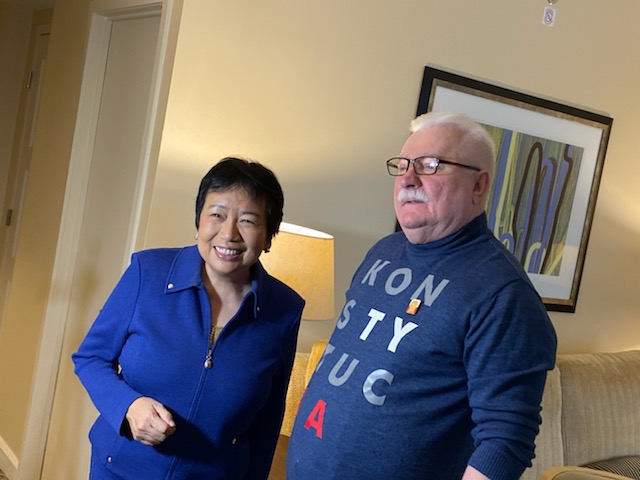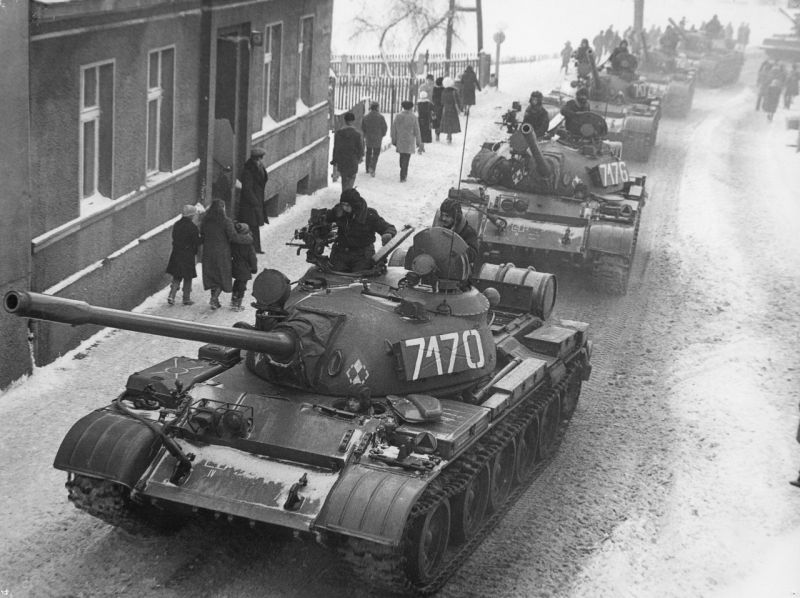Voice of America and martial law in Poland 40 years ago – a quick response by the Reagan Administration to the communist regime’s attempt at holding on to power and destroying Solidarity. Photo: Polish Army tanks enter the town of Zbąszyń while moving east towards Poznań, 13 December 1981.
A Commentary by Ted Lipien (Tadeusz Lipień), December 13, 2021.
Martial Law in Poland: December 13, 1981

Forty years ago, on December 13, 1981, I received a phone call at my home in McLean, Virginia from Charles E. “Sam” Courtney. He was at the time Deputy Associate Director of the Voice of America (VOA). Martial law had just been declared in Poland.
I was in charge of the VOA Polish Service since my boss Feliks Broniecki was ill and would soon retire. Sam asked me how VOA should respond to the imposition of martial law and communist leader General Wojciech Jaruzelski‘s attempt to crush the independent trade union and pro-democracy Solidarity (Solidarność) movement. I proposed an immediate expansion of VOA Polish Service medium wave and shortwave radio broadcasts from two and a half to seven hours daily.
Courtney promised to help me hire additional broadcasters. At the time, the Polish Service had only about 15 permanent staffers and a handful of freelancers. We had practically no money for correspondent travel or any major special coverage. Longtime, native-born VOA managers had discriminated for decades against foreign language services in the allocation of resources. Most of them held President Reagan in contempt and believed him to be a warmongering, dangerous Cold Warrior. They also accused Reagan appointees of trying to politicize the Voice of America and turn it into a propaganda tool. But as former Voice of America managers were being slowly replaced during what they called “the difficult winter of 1981/1982,” many anti-communist broadcasters in VOA language services welcomed these changes in personnel and programming. Refugee Voice of America journalists stood up to the anti-Reagan VOA English newsroom and eventually helped to win the Cold War.
Martial law in Poland: Solidarity Prisoners Listen to VOA, Praise Reagan

The Reagan administration lifted limits on criticizing the Soviet Union and communism. Some of the censorship lingered from to the period of World War II, when the chief Voice of America English news writer and editor was an American Communist, the 1953 Stalin Peace Prize winner Howard Fast.
Even in the 1970s, the VOA management banned interviews with Nobel Prize-winning Russian exiled writer Alexandr Solzhenitsyn and severely limited readings from his books to audiences in the Soviet Union. Fortunately, there was no such censorship at Radio Free Europe (RFE) and Radio Liberty (RL).
One of the Solidarity leaders forced into exile in the United States was Mirosław Domińczyk from Kielce in central Poland. He was one of the co-funders of independent trade unions in Kielce and later participated in the August 1980 strike at the Lenin Shipyard in Gdańsk. Together with Lech Walesa and other activists, he helped to create and register the independent Solidarity trade union.
On December 13, 1981, Domińczyk and thousands of other Solidarity activists were arrested by the Jaruzelski regime. He was imprisoned in various internment camps for eleven months. After his release, he went to the United States, requested political asylum and did not return to Poland until 2003. One of his daughters is Hollywood actress Dagmara Domińczyk.
The Voice of America Polish Service interviewed him shortly after he had arrived in New York in February 1983. The interviewer was VOA Polish Service stringer in New York, Zdzisław Bau whose VOA radio name was Andrzej Holik.
This is how Mirosław Domińczyk described what the Voice of America, Radio Free Europe, and Ronald Reagan meant to imprisoned Solidarity activists:
ANDRZEJ HOLIK, VOA: Did you know what was happening in the world? Did you have any outside contacts?
MIROSLAW DOMINCZYK: Only later, after about a month. When the first visits started, we received radios. I mean, they were smuggled in ingenious ways, hidden in lard, in other products. We then listened regularly to the Voice of America, Radio Free Europe. We could receive all stations, but Radio Free Europe was difficult to hear [because of strong jamming of the radio signal]. Therefore, our source of information was the Voice of America and our families who were visiting.
ANDRZEJ HOLIK, VOA: What was the mood in the internment camp?
MIROSLAW DOMINCZYK: It depends on during which period, but mostly it was cheerful, we sang songs. They were about Reagan.
ANDRZEJ HOLIK, VOA: What was the song about President Reagan?
MIROSLAW DOMINCZYK: To the melody of Glory, Glory, Hallelujah, “Reagan is our greatest friend.” I’m not a singer, otherwise I would sing it, but there are recordings. May be later I’ll present them.
ANDRZEJ HOLIK: He was so popular among you?
MIROSLAW DOMINCZYK: He was and still is, yes.
Voice of America Expands Reach During Martial Law in Poland
While in 1981 we in the Voice of America Polish Service were no longer subject to previous restrictions on countering Soviet propaganda, neither Sam Courtney nor any Reagan-appointed official tried to tell me what we should broadcast to Poland. What they gave us was permission to expand permanently our broadcasts and money to hire more staffers. We also had money to send them on reporting assignments in the United States and abroad.
Reagan’s many critics among Voice of America senior officials who were previously in control of programming, as well as some editors and reporters and in the VOA central English newsroom, predicted that the management changes imposed by the Reagan administration would ruin VOA’s credibility.
As it turned out, VOA’s audience in Poland increased fivefold when I was in charge of the Polish Service during the Reagan years.

Sam Courtney who offered to help us increase radio broadcasts to Poland and made good on his promise, was a Foreign Service Officer (FSO) in the United States Information Agency (USIA), which was at the time the parent agency of the Voice of America. Before his assignment at VOA, he had served as a public affairs officer (PAO) in Pakistan in Turkey and in various USIA positions in Washington. In 1984, President Reagan nominated him to be an Associate Director of the United States Information Agency (Programs).
Communists Confident Their Rule Would Continue
Martial law officially ended on July 22, 1983, but repressions against Solidarity human rights activists continued for a few more years.
In 1985, Interpress, the agency of the communist regime in Poland providing information and services to foreign journalists while also engaging in intelligence gathering and spying activities against them, published a 124-page booklet titled, “Panorama dywersji, czyli obraz Polski w propagandzie Głosu Ameryki w latach 1982-1984,” (“Panorama of sabotage, or the image of Poland in the propaganda of the Voice of America in 1982-1984”).

Communist propagandists tried to assure Polish and foreign readers in 1985 that “socialism” and Communist Party rule in Poland would last forever:
The long-term nature of the strategic anti-communist goals represented by the American administration proves that we will have to deal with manifestations of anti-Polish activity in the future. Poles who are struggling to build their future are faced with the task of acquiring knowledge about the intentions, goals and techniques used in the contemporary mechanisms of propaganda sabotage directed against the national interest of socialist Poland. However, all attempts to turn Poland back from its socialist development — as the history and present day of the Polish People’s Republic prove — have no chance of success.
Interpress [communist government agency], Poland, 1985
Solidarity Leader and Former Polish President Lech Wałęsa
Lech Wałęsa, who later became President of independent Poland, said in a 2002 VOA interview that Solidarity’s victory would not have been possible without the Voice of America, Radio Free Europe and other independent media outlets.
LECH WALESA: Therefore, it is difficult to imagine what would have happened if it were not for the Voice of America and other sources with the help of which the true information squeezed through, which showed a different point of view, which said that we are not alone and that something is happening in the country — because our mass media did not do that.

In 2019, former Voice of America China Branch chief Sasha Gong interviewed Nobel Peace Prize laureate Lech Wałęsa in Washington, DC for her documentary on the crimes of communist dictatorships and those who have dared to oppose Marxist regimes around the world.
Gong, a former political prisoner in China and later an exile in the United States who had received her PhD from Harvard, is one of the so-called “VOA Mandarin Five” broadcasters. In 2017, the VOA and U.S. Agency for Global Media (USAGM) management disciplined them for not quickly cutting short their live interview with Chinese anti-communist whistleblower Guo Wengui.
The then Voice of America director, Amanda Bennett, who in 1987 had shared with her Wall Street Journal colleagues a Pulitzer Prize for National Reporting, ordered Gong to shorten the live interview because of what she said was the need to protect VOA’s objectivity. Bennett later denied that VOA had caved in to pressure from the Chinese government, but she and VOA came under heavy criticism from social media users in China and from Chinese-Americans. China Branch journalists said that the VOA Chinese audience reach dropped after the shortening of the Guo interview.
Gong had questioned Bennett’s decision on the Guo interview and was later fired but reached a confidential settlement with the VOA and USAGM management. Some of the other VOA Mandarin Five journalists have returned to work, and some are reportedly still challenging the management’s disciplinary actions against them through the arbitration process. President Biden has nominated Amanda Bennett to be the next USAGM CEO. Her appointment awaits a confirmation by the U.S. Senate.
When the communist regime in Poland introduced the martial law on December 13, 1981, few people thought that communism in East Central Europe would fall in less than ten years. According to a YouTube description of Sasha Gong’s film “Sisyphus,” it “is a story of superheroes who brought the communist empire to its knees, and changed the history of the 20th century.”
The documentary, which is yet to be released includes interviews with anti-communist human rights and democracy activists: Lech Wałęsa, Vytautas Landsbergis, Martin Palouš, Wei Jingsheng, Miklos Haraszti, Liu Suli, Irena Lasota, Thomas Berty, Wang Kang, Oleg Kalugin, Fang Zheng, Wang Juntao, Jiri Kaba Kabes-Viola, Joe Carnation, Attila L. Bese, and Zygmunt Staszewski. Sasha Gong now works as an independent broadcaster, producing programs in Cantonese for Hong Kong and supporting the struggle for human rights and democracy in China..
In December 1981, I and my colleagues in the Voice of America Polish Service were lucky to have the support of President Reagan and his administration, as well as bipartisan support from Democrats and Republicans in the U.S. Congress and from the vast majority of Americans.
We were helped by USIA Director Charles Z. Wick, Sam Courtney and other senior agency and Voice of America officials, including Kenneth Tomlinson, who would soon become the new VOA director. Tomlinson gave the VOA Polish Service additional resources to cover the papacy of John Paul II.
The situation in Poland looked bleak at the time of the declaration of martial law in Poland on December 13, 1981. But as we have learned, with the right policies, good management and sufficient budgets, uncensored international journalism can make a big difference for achieving freedom and democracy. In some countries, faster than in others, but not if policies are flawed and the management lacks competent leaders.
I hope that VOA journalists who now broadcast to Afghanistan, China, Cuba, Iran, North Korea, Venezuela and to other countries without free media will not be discouraged by setbacks and attempts to glorify communism and communist dictators like Fidel Castro or Che Guevara. Policies and managers can change. Those committed to honest and objective journalism must not give up.

I hope they will continue their struggle with the same courage shown by thousands of former anti-communist VOA journalists of the Cold War period. This is my way of recognizing the great work of my Polish Service colleagues who prepared our broadcasts during the difficult years of the communist martial law in Poland.

